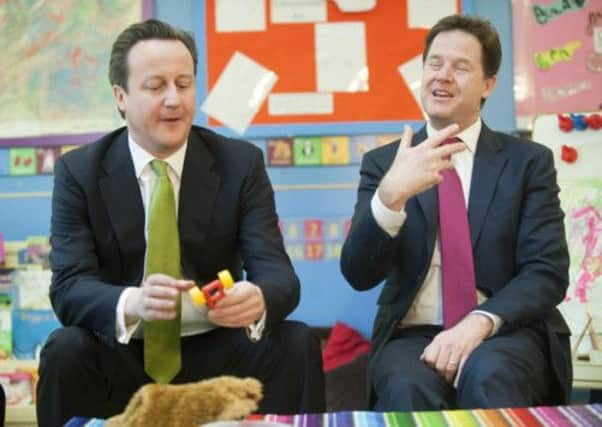Move to help with childcare costs ‘will do little for the most needy’


Under the plans, set out on the eve of the Budget, families where all parents work will receive up to £1,200 a year towards care for each child – up to a maximum of 20 per cent of their annual costs –so long as no parent earns more than £150,000 a year.
But the tax-free scheme, which replaces the existing employer-supported childcare (ESC) voucher system, does not come into effect until late 2015.
Advertisement
Hide AdAdvertisement
Hide AdLow- and middle-income families claiming tax credits will remain on a separate programme where increased support does not come on stream until a year later, while those where one parent does not work or has a part-time job will receive nothing.
Ministers said that 1.3 million families will initially benefit – compared with 450,000 under ESC – eventually rising to around 2.5 million as the scheme is extended from under-5s to under-12s.
Visiting a nursery in south London, Prime Minister David Cameron said it would be “a real help to people who want to go out to work” and need childcare.
“Too many families find paying for childcare tough and are often stopped from working the hours they’d like,” said the PM.
Advertisement
Hide AdAdvertisement
Hide Ad“This is a boost direct to the pockets of hard-working families in what will be one of the biggest measures ever introduced to help parents with childcare costs.”
Deputy Prime Minister Nick Clegg said: “There are so many parents who want to actually mix work and family but feel at the moment it just makes no sense to do so.
“I hope that this, when it starts in 2015, will make a big, big difference to those parents who presently just don’t think it’s worth working.”
Charities working with children and the poor welcomed the scheme as a step in the right direction, but criticised the delay in its implementation and the failure to give more help to the poorest families.
Advertisement
Hide AdAdvertisement
Hide AdBarnado’s noted that four-fifths of the funding is directed at the tax-free scheme for parents earning up to £150,000, while just one-fifth will go to lower earners on universal credit, who must wait until 2016 to see support rise from 70 per cent to 85 per cent of the cost of childcare.
William Higham, director of UK policy at Save The Children, warned that struggling families will face “another three years of juggling costs amidst a deep recession”, while the Children’s Society said the poorest parents were being “missed out” altogether.
The Child Poverty Action Group said the new scheme was “massively complicated, poorly targeted and too many years away to provide comfort for families struggling right now”, as well as being “weighted heavily in favour of those on high incomes”.
The charity Working Families raised concerns that – unlike the ESC vouchers – the new system will provide no help for couples where one partner is studying or retraining or has been made redundant and is looking for work.
Advertisement
Hide AdAdvertisement
Hide AdThe Federation of Small Businesses welcomed proposals which national chairman John Walker said should “increase flexibility in the workforce and encourage more women back to work”.
But Neil Leitch of the Pre-School Learning Alliance, which represents childcare providers, said: “This seems to be more about pushing parents back to work rather than providing real childcare choices.”
Labour warned that a couple with one child paying basic rate income tax will lose £600 compared with the existing scheme.